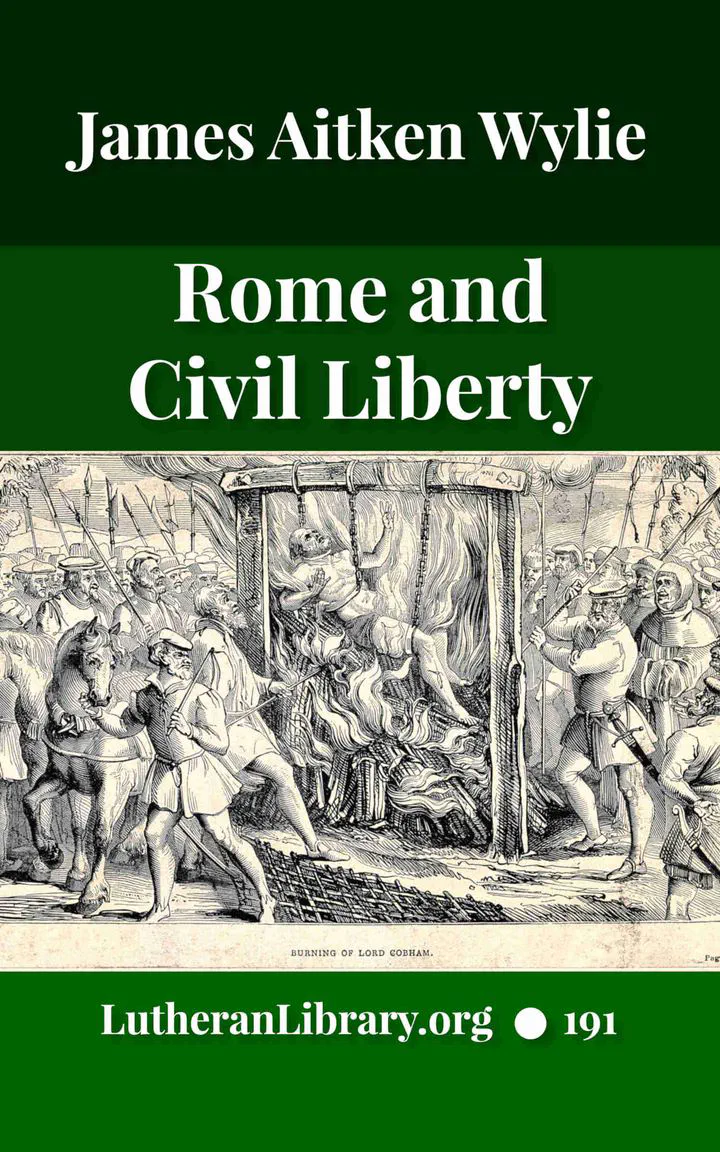Rome and Civil Liberty by James Aitken Wylie

“Popery, age after age, retires deeper and deeper into the darkness. In proportion as the light increases, the Papacy drops thicker and yet thicker veils betwixt itself and the world. Whenever its designs are in danger of being discovered, it folds over them the skirts of its sable mantle. If still they shine through, it doubles the folds. It would appear thus to quit the scene of human affairs; but in reality it is all the while, in virtue of its invisibility, going deeper into the very heart of them.
“The Papacy is neither a less influential nor a less meddlesome thing at this day than it was centuries ago: but it is a far subtler and a more invisible thing than it was then. Innocent III. sat openly upon his throne; and whatever he did he did boldly and defiantly, neither disguising his acts by pretexts, nor excusing them by apologies. He governed with a bold truculence, which inspired respect after a fashion, while it awakened universal dread, and extorted universal worship, making kings bow as low before his footstool as the poorest peasant in all their dominions.” — James Aitkin Wylie
Level of Difficulty: Primer: No subject matter knowledge needed.
James Aitkin Wylie LL.D. (1808-1890) was a Scottish historian of religion and Presbyterian minister. His most famous work is the four volume History of Protestantism. Other important books include The Great Exodus, or “The Time of the End”, Rome and civil liberty: or, The papal aggression in its relation to the sovereignty of the Queen and the independence of the nation, The Papacy: Its History, Dogmas, Genius, and Prospects, The Jesuits: Their Moral Maxims and Plots Against Kings, Nations, and Churches, The Papacy is the Antichrist - A Demonstration.
Book Contents
- Preface.
- Part I. The Reformation.
- The Fundamental Principle Of The Reformation, And What It Gave Us.
- The Fundamental Principle of the Reformation gave us a Scriptural Church.
- The Fundamental Principle of the Reformation gave us a Free State.
- The Fundamental Principle of the Reformation gave us our Inductive Philosophy.
- It was the Fundamental Principle of the Reformation that gave us our Literature.
- Part II. The Papal Aggression.
- Pleasant Changes In The Distance.
- The Reconnoitre, Or First Steps.
- The Edict From The Flaminian Gate.
- The Partitioned Land.
- A Battle That Was Not Fought.
- The Empire Within The Empire.
- The King Of The New Kingdom.
- The Twelve Thrones.
- The Law Of The New Kingdom.
- Canon Law Versus British Law; Or, A Battle For Magna Charta.
- The Subjects Of The New Kingdom.
- Romanists Declaring That They Will Not Obey The Law.
- Rome’s Sappers And Miners.
- Rome’s Grand Missionary Institute
- Part III. Illustrations From Recent European History.
- Projected Development Of The Papal Aggression.
- The Synod Of Thurles; Or, Let The Light Be Anathema.
- The “Ascot Fathers” Or, Let There Be Darkness.
- Franzoni And Santa Rosa; Or, Rome’s Spiritual Discipline.
- Liberalism And Popery; Or, Rome’s Reciprocity In Toleration.
- The Madiai, Or, The Inquisition In The Nineteenth Century.
- Part IV. Maynooth, Convents, Chaplaincies, Etc
- Maynooth.
- Maynooth: The New Way Of Deposing Monarchs.
- Maynooth: A Sure And Ingenious Way Of Releasing Subjects From Their Allegiance.
- Showing How Rebellion May Be Preached According To Maynooth
- “Spiritual Direction” At The Hustings.
- Not Two Romanisms In The World.
- Convents; Or, How To Steal A Country And Its People Piecemeal.
- Convents Versus Habeas Corpus.
- Paradises With Bolts And Bars.
- Piedmont: An Illustration.
- Begging Nuns; Or, Alms For The Poor Priest.
- Chaplaincies.
- Father M’Gurr; Or, How The Popish Endowment Scheme Began.
- Chaplaincies: Criminals In Exchange For Gold Guineas.
- The Prime Minister And The Tempter.
- The Battle; Or, Popish Organization In Britain.
- Part V. Miscellaneous.
- Can Romanism Be Traced In The New Testament?
- Spain: The Penalty Of Bible-Reading.
- The Revolution: Its Policy Reversed.
- The Troubles Of Europe
- Development Of Jesuitism.
- Copyright Notice
Order a Printed Copy
Print Copy: Rome and Civil Liberty by James Aitken Wylie - “Lutheran Librarian” edition
Publication Information
- Lutheran Library edition first published: 2021
- Copyright: CC BY 4.0
